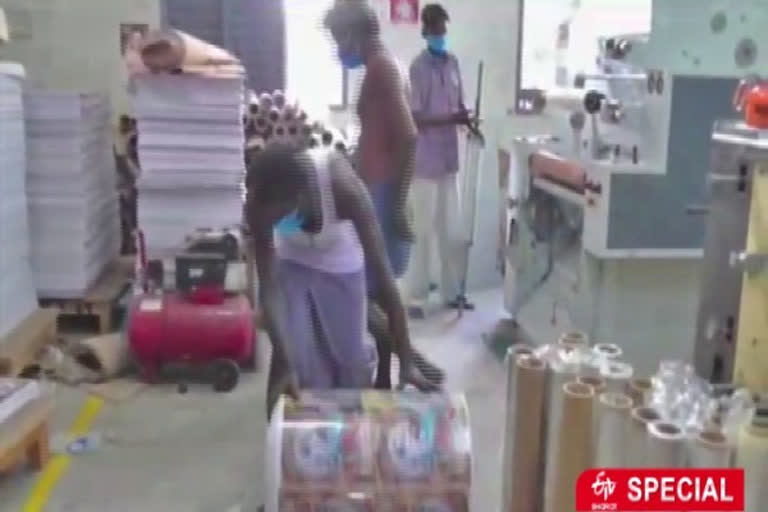Virudhunagar (Tamil Nadu): Fresh as the beginning of an academic year, the fragrance of new books captivates the school as well as college-going students. Even adults can’t be any different. Such is the magic spell which none can escape from.
The first couple of weeks when the schools and colleges reopen after the summer vacation are spent putting wrappers to the books and notebooks. The children gaze through the pictures with awe and excitement with their eyes turning wide open is a poetic expression in itself.
Will the coming academic year recreate the poetic feeling among them? It is doubtful, given the setback that the printing industry is facing because of the extended lockdown.
There is a big question mark as to whether students would be able to get the study materials on time this year when the educational institutions reopen once the lockdown is lifted. Leave alone notebooks, will they hope to get the textbooks without any delay?
The huge scarcity of raw materials, including the availability of paper and other ingredients, has crippled the printing industry.
After the hike of 30 per cent in prices, poor students would face a critical situation where they might find it difficult to buy even two notebooks.
Workers of Printing Units Face the Crunch:
Hectic work commences for the employees of various printing units when schools and colleges close for the summer vacation.
The industry will be bustling with activity, most of them running non-stop with increased shifts for the workers.
From April to June, the printing units used to have a heavy load of orders and as such, they race against time. For the next six months, they depend upon the orders placed by the publishers.
Workers at printing units said, "Summer used to be the busiest season for us. It is the time we work round the clock in multiple shifts to complete orders. The lockdown due to the coronavirus pandemic has brought down production by half."
Now, the cost of the raw materials like the paper board, lamination paper and ink among other things, has increased manifold.
Despite the hike in prices, their availability too has shrunk, according to manufacturers.
Naturally, this might result in the cost of production, which in turn would be transferred to the customers.
Right from a 96-page or 192-page notebook, textbooks too would cost more. Another concern is the potential scarcity of books and study material.
Facing the Heat - Sivakasi the Printing Hub:
Known as the printing hub of the country, Sivakasi in Virudhunagar district has 300 major printing units and over 500 small-medium enterprises engaged in this.
Next to the fireworks industry, it is the printing industry that provides direct employment to nearly 30,000 workers and indirect employment to over 80,000 people.
Production of calendars and diaries of various designs provide them work round about the year. But, the corona-induced lockdown has robbed them of the seasonal work this summer.
"For more than 50 days, the whole printing industry remained shut. There is scarcity in the availability of the necessary raw materials to resume printing works as well as the chemicals to re-start the machinery. As such production is hampered," bemoans Daniel, proprietor of a printing unit.
"We used to secure them from abroad and also from other states. With public transport yet to commence, we are not able to source the materials. We have resumed operations with what we have at hand," he added, betraying a hope that the situation would get normal soon.
According to industry sources, scarcity and paucity of paper materials from abroad, especially from China has left many units to run half their capacity.
Further, the impending crisis might result in a 30 per cent hike in the cost of notebooks, he made it clear.
If the issues and concerns of the printing industry are not addressed with the seriousness they require, there will be a huge delay in printing and supplying textbooks.
As a consequence, students might suffer. The industry hence awaits the early resolution of the issues by both the Centre and the state governments.
Also Read: Tamil Nadu has suffered Rs 35,000 Cr revenue loss during lockdown: CM



